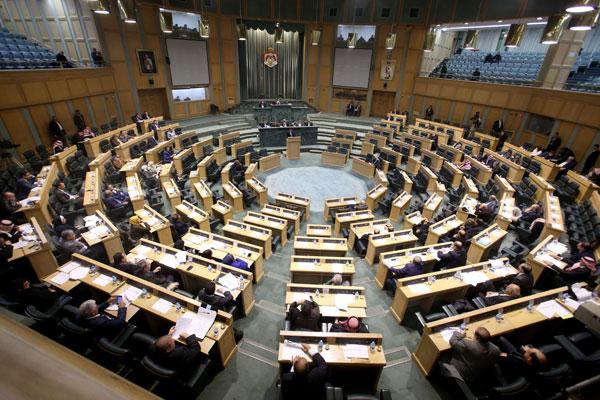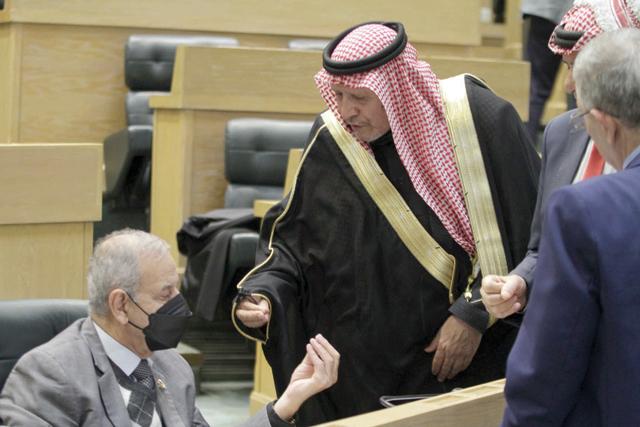You are here
New elections this year is likely scenario — pundits
By Khetam Malkawi - Feb 25,2016 - Last updated at Feb 25,2016
AMMAN — Although the term of the Lower House ends in January 2017, parliamentarians and analysts foresee a dissolution this year to prepare for new elections, and, automatically, the departure of the incumbent government.
The House on Tuesday passed the draft 2015 parliamentary elections law with minor changes following six sessions of debate that began Sunday.
Commentators interviewed by The Jordan Times agreed that no solid proof can be cited to substantiate their theory, except the “acceleration of the endorsement of the elections poll by the House”, which seemed to some as “imposed from outside”.
All expected scenarios boil down to what His Majesty King Abdullah decides in line with his constitutional powers. As per the Constitution, only the King is entitled to dissolve Parliament before its term ends, keep it sitting untill the end of the four-year term, or prolong the term of the chamber for a period of “not less than one year and not more than two years”.
“It is up to the King when to dissolve the Lower House,” said Khaled Kalaldeh, minister of Political and Parliamentary Affairs, who declined to comment on the scenarios expected.
The first possibility is to dissolve the legislature in May upon the conclusion of the ordinary session and hold the elections within four months. The second is to dissolve it in July, in case there was a need to convene Parliament for an extraordinary session, and conduct the elections in November.
Paragraph A of article 73 of the Constitution states that “If the Chamber of Deputies is dissolved, a general election shall be held, and the new Chamber shall convene in an extraordinary session not later than four months from the date of dissolution. Such session shall be deemed to be an ordinary session in accordance with the provisions of Article 78 of the present Constitution and shall be subject to the conditions prescribed therein in respect of prolongation or adjournment”.
The third scenario is to dissolve the Parliament in January 2017, when the chamber ends its Constitutional term. The fourth possibility, of course, is to keep the current legislature in session up to two additional years.
Waleed Hosni, a veteran Parliament correspondent, said that regardless of all these options, it is likely that the elections would take place this year, because even if the Parliament remains in session until the end of its term, the polls, according to the Constitution, must be conducted four months prior to January 17. He did not see any reasons that would prevent holding new polls, whether the current legislature is dissolved or left to end its tenure.
Long-time lawmaker Khalil Atieh sensed a “political will” to have the bill passed as soon as possible. In that outcome, he said, the new polls are likely to take place this year.
“The way in which the law was endorsed by the House and the brief time MPs needed to debate it indicates there is a political will to conduct the elections this year,” Atieh told The Jordan Times.
House members Wafa Bani Mustapha and Abdul Karim Dughmi agreed that the elections would be conducted “soon”.
To Dughmi, the legislative reform package is now in place, so “why the wait?”
The other reform-oriented laws are the Political Parties Law, Decentralisation Law and Municipalities Law.
“Although some argue that the elections might not be conducted while regional crises are raging around us, we have our internal priorities and regional turmoil should not affect the country’s political process,” Bani Mustapha told The Jordan Times.
The government, according to parliamentary affairs expert Majid Ameer, is expected to stay in office as long as the Parliament is in session.
“Once the Chamber of Deputies is dissolved, the government will resign and a new government will handle the elections,” Ameer told The Jordan Times.
Related Articles
AMMAN — President of the Independent Election Commission (IEC) Khaled Kalaldeh on Monday accused supporters of the former one-person, one-vo
AMMAN — A Royal Decree was issued on Wednesday, postponing the first ordinary session of the two Chambers of Parliament to November 7, 2016,
AMMAN — The Lower House on Wednesday continued its deliberations on constitutional amendments.The Lower House, with a majority of 100



















